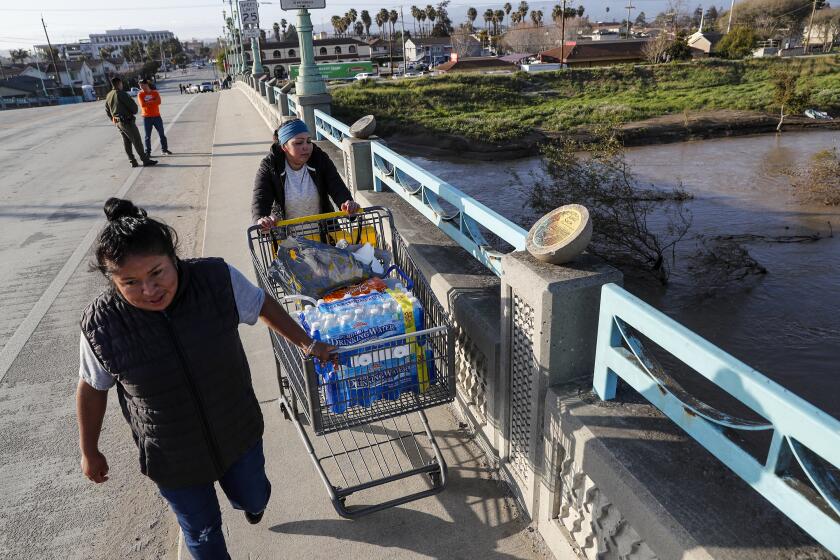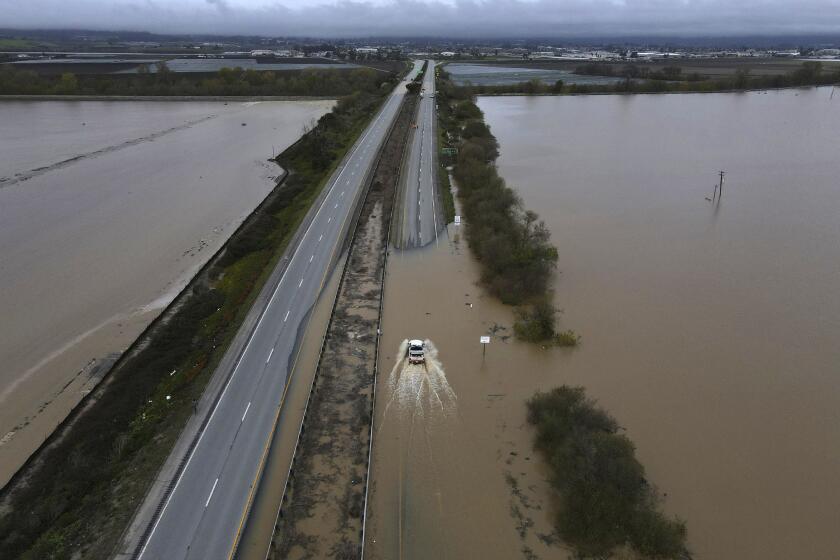‘It’s environmental racism’: Monterey County sued over farm chemicals near mostly Latino schools

- Share via
For Nelly Vaquera-Boggs, the plastic tarps that cover strawberry fields in Monterey County when they are being fumigated with toxic chemicals offer little comfort — especially when those fields are close to schools.
The tarps, she said, sometimes come loose in the wind. They can get holes.
And in the small farm towns of the Pajaro Valley, where schoolyards often abut agricultural land, Vaquera-Boggs worries that — tarps or no tarps — those pesticides are drifting beyond the fields and endangering children.
“Teachers have been concerned about nearby application of pesticides and fumigants for decades,” said Vaquera-Boggs, president of the Pajaro Valley Federation of Teachers. “We live in an area that provides strawberries and a lot of the food that we consume, but we also still believe this can happen and our communities can be safe.”
This month, the teachers union, which represents around 1,100 school employees, joined four environmental and social justice groups in suing Monterey County agriculture officials and state pesticide regulators, alleging they disregarded children’s health by allowing several farms to use restricted pesticides in close proximity to three elementary and middle schools whose students are mostly Latino.
“It’s environmental racism,” said Yanely Martinez, a Greenfield City Council member and organizer for the group Safe Ag Safe Schools, one of the plaintiffs. “These are communities of people of color. These are the communities of farmworkers that are putting food on the table. The families are being silently killed.”
Founded as a labor camp for agricultural workers, the small community of Pajaro has long languished in the shadow of nearby Watsonville.
The lawsuit, filed April 4 in Monterey County Superior Court, targets the Monterey County agricultural commissioner, Juan Hidalgo, and the California Department of Pesticide Regulation and its director, Julie Henderson.
The plaintiffs, which include the Center for Farmworker Families, the Monterey Bay Central Labor Council and Californians for Pesticide Reform, are being represented by the environmental law nonprofit Earthjustice.
At issue are six permits — issued last summer by county agriculture officials under the purview of state regulators — that allowed the use of the fumigants chloropicrin and 1,3-dichloropropene (known as 1,3-D) in fields near Ohlone Elementary School, Hall District Elementary School and Pajaro Middle School, which also have on-site daycare programs.
The plaintiffs allege county agriculture officials are too quick to rubber-stamp pesticide permits without properly considering alternatives.
“It’s rarely the case where you see permits being denied. It’s approval after approval,” said Martinez, a mother of four who said she and other organizers have been repeatedly stonewalled by county officials who refuse to meet with them.
In a statement, the Monterey County agricultural commissioner’s office said it “meticulously follows all federal and state regulations when issuing pesticide permits.”
“We conduct regular field inspections to ensure compliance and promptly investigate any illnesses or concerns related to pesticide use that may arise in the community. Protecting agricultural workers, our neighborhoods, and the environment isn’t just a job for us — it’s our duty.”
The state Department of Pesticide Regulation said in a statement that it continuously evaluates potential impacts of pesticide exposure on sensitive populations, including children. It did not directly comment on the lawsuit.
According to the department’s annual report for pesticide use for 2021, the most recent year available, Monterey County ranked sixth among California’s 58 counties for the amount of pesticides applied, with more than 9 million pounds used on 6.5 million acres.
State health officials have long reported that children in Monterey County are among the most likely in California to attend schools near fields treated with toxic pesticides.
For years, experts had been warning Monterey and Santa Cruz County that the levee along the Pajaro River could fail.
The fumigants named in the suit are used to kill soil-borne pathogens and pests — namely, nematodes, the ubiquitous worms that can wreak havoc on plants including strawberries, which are the most lucrative crop in Monterey County, bringing in nearly $1 billion a year.
Chloropicrin — which was used as a tear gas during World War I — can severely irritate the eyes, throat and lungs, leading to coughing, choking and shortness of breath, according to the Centers for Disease Control and Prevention. Federal health agencies have long considered 1,3-D a likely carcinogen.
Both fumigants are designated in California as restricted materials, which require a county-issued permit for use because of their higher potential for harming human health compared with other pesticides.
The lawsuit does not name specific incidences of children, school employees or other adults being sickened by the fumigants.
Norm Groot, executive director of the Monterey County Farm Bureau, dismissed the lawsuit as the work of activist organizations that do not understand that, “without agricultural chemicals in situations where we are growing crops very sensitive to pests and diseases, we won’t have food.”
Groot said the fumigants in this case are injected into the soil, which is then placed under a plastic tarp that remains over the field for seven to 10 days until the chemicals have dissipated. There is “no transmission into the atmosphere of any of these chemicals,” Groot said.
Six farms, each of which obtained permits to fumigate, also are named in the lawsuit.
A manager for one of them, Bay View Farms LLC, said the fumigation process is “really heavily regulated and inspected by not just the county, but also the state.”
Bay View Farms, he said, grows strawberries on about 45 acres near Ohlone Elementary. It got a permit last August to use chloropicrin and 1,3-D. The manager, who spoke to The Times on the condition of anonymity to discuss pending litigation, said that every three years the Bay View crop is rotated with another company that grows vegetables.
“We do it when the students are not at school,” he said of fumigating. “We don’t want to do anything to kids.”
Greg Loarie, an attorney for Earthjustice, said it has long been “nearly impossible” for members of the public to learn exactly when fumigants are going to be applied so they can take precautions, like avoiding being outside near the fields. The permits are valid for at least several months and are not easily accessible for inspection since they are not posted online and require a public records request to view.
“Parents and teachers certainly have a right to know when toxic pesticides are being sprayed right next to their schools, and this process needs to be public and needs to be meaningful,” he said.
“What we really want, at the end of the day, is we want the poisoning to stop. We want someone to be addressing the fact that cumulative exposure to these pesticides, year after year, is poisoning our kids.”
More to Read
Sign up for Essential California
The most important California stories and recommendations in your inbox every morning.
You may occasionally receive promotional content from the Los Angeles Times.













